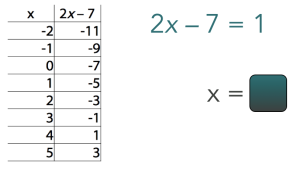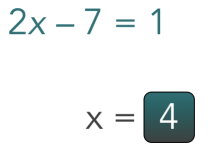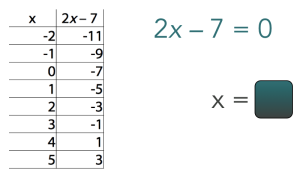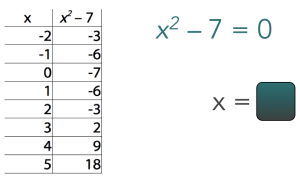I hear this all the time, and it drives me up a wall.
I haven’t solved for x in years, and I’m doing just fine.
Few people realize that while they aren’t using algebraic properties in their daily lives, they use the analog concept of finding missing values all the time. You won’t win this argument with most people though. It just doesn’t seem like algebra.
As math teachers, we also get annoyed when students are able to do this with nothing in between:
Certainly in a Calculus class, this should not surprise us – at that level we would expect an ability to eyeball the solution. At the other end of the post elementary math progression, however, when we are teaching two step equations for the first time, our response might be this: “Yes, you got that one, but I could give you one that has negative numbers or (GASP!) decimals or fractions in it. Then what would you do? This is why it’s important that you pay attention to this lesson. You have to do it this other way in order to get credit.”
I’ve had this conversation, and it has always made me feel ridiculous. It’s an arbitrary and crappy argument. It might be a valid one if standardized (or your own) tests of algebraic concepts are involved, but using tests as a motivation for doing anything makes the whole enterprise feel cheap, even when doing so needs to happen.
The bigger issue is that it perpetuates the reputation of math teachers and mathematicians as protectors of a sacred bag of secrets that nobody outside of a math classroom will need. It also presents a problem of artificiality. If I can suddenly make something harder by adding fractions or decimals, does doing so make it any easier for me to assess whether my students know what they are doing in solving an equation? I think we haven’t done a great job of building in the need for algebra, especially in light of what computers can do. I’ve never had a student sarcastic and comfortable enough with me to do this, but bear with me. The theoretical argument in the back of my mind to what I said in response to the student I described earlier is this:
Really teach? With that college degree of yours, you could make up a question that I can’t use my knowledge of arithmetic to solve? Impressive. I guess that even though I did everything my previous teachers told me to do – memorize multiplication tables, learn to add fractions with like/unlike denominators, draw lots of pie charts demonstrating equivalent fractions, AND draw lots of connect-the-dot dinosaurs as reviews of plotting in the coordinate plane, I still need you. Glad to be here. Oh, your tie is crooked. At least I can still help you out with that.
Furthermore, I wonder about the challenge of motivating algebra given that Wolfram Alpha, CAS, and even the lowly TI-83 solver can solve equations without breaking a sweat.
I’m not teaching introductory algebra right now, but the thinking I’ve done on how computers put the thinking back into process has me wondering how motivating the need for Algebra could be different, and better given how easy it is to compute these days. The most basic way that people interact with numbers is through tables and graphs – is it possible to motivate algebra through this familiar idea? Can we use the computer to compute a bunch of stuff, and see what it tells us?
Some food for thought:

This is precisely the sort of thing we are looking for when we are solving an equation, but it’s rare that we think about it this way. It’s also something that most people outside of a classroom will do with a table of values in a newspaper or a website, for example. It is typically for more practical reasons (predicting value of a stock, figuring out when a bus will arrive at our location from a schedule that doesn’t have every stop, etc) than simply finding ‘x’ as we ask students to do in the classroom. Is this algebra? Staring at a table of values is tedious, but I know people that would rather do this than solve an equation or do anything that smells like school math.
Again, in our adult lives, we make estimations from given information from a table or graph from time to time, but few adults actually call this algebra. Is it obvious to an adult that changing the interval in the right way would allow the exact answer to be found? Is it obvious to a student? It’s a subtle point here, but I think it’s the sort of reasoning we want our students to be capable of doing. Is that type of understanding something inherently important in algebraic reasoning? How’s that going for us now?
We know there are algorithmic ways to solve this one, but I’ve already said here and in previous posts that I want to get away from mathematical thinking as a bag of algorithms. How good of an answer to this can we get from a table? I don’t know about you, but I have yet to feel like I’ve taught well the idea of an irrational number in a good, intuitive way that doesn’t result in students memorizing tricks. I think this hints at this concept in ways that is inaccessible without using computers. Even on a calculator, it’s difficult to focus in on solutions as smoothly as I think can be done with a table of rapidly computed values.
I’m not suggesting that we shouldn’t teach properties of numbers and inverse operations in the context of solving equations algebraically. I think we need to do a better job of selling the idea of algebra as being an enhancement of what we already have built in to our brains. We estimate what time we need to cross the street to not get hit by a truck but also to minimize our time waiting. We know that if the high is 68 degrees at 3 PM, that it will probably be a nice temperature outside at one-o-clock. This way of feeling our way to a solution through intuition, however, is not the optimal way to solve problems, especially when our intuition is wrong. There needs to be a better way.
Our students (and many adults) often don’t know how to create tools to help them solve the problems they face. They choose to do things that are tedious because they don’t know a better way, and the math skills they have developed previously are disconnected and seem irrelevant as a result. We do understand the idea of computation, but we often aren’t good at doing it ourselves. If nothing else, it’s pushing people to become more confident that they know what they are looking at when we see a bunch of numbers together.





I think you could easily extend this table of values argument to a lot of areas of mathematics rather than just algebra. I’m going to see what our 8th and 9th grade teachers (who teach this level of algebra) think of this idea.
Thank you David – it would be great to hear what your teachers think. Keep me posted.
I think your philosophies play into the natural abilities humans have as pattern inclined, puzzle solvers. Thanks for your post.
Pingback: Half Full Activity – Results and Debrief | gealgerobophysiculus